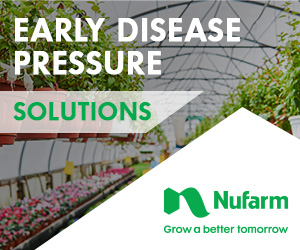Marketing To Generation Z: Young Industry Leaders Share Their Ideas
In our first ever Google Hangout, Greenhouse Grower posed a question to a panel of young marketers and savvy growers from operations across the country about how we as an industry can market our products to upcoming generations:
Generation Z, the age group beyond Generation Y, is said to be kids born between 1995 and 2009. These kids are already being marketed to as children and they will be our age in 30 years. They’re true digital natives with an infinite number of options competing for their time and attention. How can our industry effectively start to build interest and awareness in our products?
Here are their thoughts.
 Marta Maria Garcia, Costa Farms: I have a 3-year-old and I look at him everyday and everything he’s exposed to, and I think about the things that we bought for him when we were preparing to be parents. It’s going to be interesting to see how that generation evolves. I’m so looking forward to it as a marketer because I see my son and the things that he does and he blows me away every day. I think this is a generation that we need to really talk to and educate about our products.
Marta Maria Garcia, Costa Farms: I have a 3-year-old and I look at him everyday and everything he’s exposed to, and I think about the things that we bought for him when we were preparing to be parents. It’s going to be interesting to see how that generation evolves. I’m so looking forward to it as a marketer because I see my son and the things that he does and he blows me away every day. I think this is a generation that we need to really talk to and educate about our products.
Here at Costa, we grow potted houseplants and we target this generation through our “O2 For You” Initiative. We go to schools and we talk to teachers. We do Earth Day events to communicate the benefits of having plants around the home. Research shows that if you target children between the ages of 6 and 8 and talk to them about certain things, like our industry, it is bound to happen that later in life, after they’re 18, they’re going to come back. There are certain developmental years when things that kids do with parents and things they’re exposed to stay with them. That age group, 6- to 8-year-olds, is really important and we really need to introduce them to the outside world, to getting their hands dirty. Think about it – that’s the age when they naturally enjoy all of these things.
So I think we, as an industry, need to do a lot of work in getting out there to the schools, talking to kids and moms and telling them about all the benefits of working with our products. I’m very passionate about that age group, both for personal reasons and marketing-wise for our industry. I think it’s going to be very valuable.
 Kristine Lonergan, Garden State Growers: It’s two-fold. One of the things this industry needs – not just for that generation but for many – is an identity, whether it’s a pop icon or an athlete or just somebody. A lot of industries do this but we need it desperately. Right now, Martha Stewart is not someone the younger generations are going to identify with. We need to make gardening a little bit sexier.
Kristine Lonergan, Garden State Growers: It’s two-fold. One of the things this industry needs – not just for that generation but for many – is an identity, whether it’s a pop icon or an athlete or just somebody. A lot of industries do this but we need it desperately. Right now, Martha Stewart is not someone the younger generations are going to identify with. We need to make gardening a little bit sexier.
The other thing is, it would be ideal if there were more apps that could be downloaded on mobile phones that sort of emulated gardening or got younger consumers interested that way. Social media and mobile apps are where younger generations get interested in a lot of new opportunities. I know we have Farmville on Facebook but that’s a little bit different. We need a real app that can get them intrigued.
 Rob O’Hara, Rainbow Greenhouses: We do tours through the greenhouse and there’s not a kid that comes through here who doesn’t just absolutely love plants at that age. They are interested in what we do and are really captive to what we’re saying. I’ve toured college kids and high school kids through here, too, and by that time, they’re pretty much lost. They don’t ask nearly the number of questions and they aren’t as interested as a group of 8- and 9-year-olds. So I think kids are very easy to influence at that young age.
Rob O’Hara, Rainbow Greenhouses: We do tours through the greenhouse and there’s not a kid that comes through here who doesn’t just absolutely love plants at that age. They are interested in what we do and are really captive to what we’re saying. I’ve toured college kids and high school kids through here, too, and by that time, they’re pretty much lost. They don’t ask nearly the number of questions and they aren’t as interested as a group of 8- and 9-year-olds. So I think kids are very easy to influence at that young age.
You also have to spin the message about a healthy lifestyle because younger generations are going to be concerned about what products will do for their health and how they will affect the environment. They’re interested in that. Then, as they’re moving through the teenage years, there’s got to be someone, like an icon or somebody who can promote the industry and keep them interested.
I had my niece here a couple months ago and within minutes she had me on Twitter, Facebook, Instagram, all three going at once. I didn’t know where I was going; she did it in seconds. Kids are interested in that kind of stuff and what their friends are doing. If there is a way to introduce our products, and keep the interest going through social media, that’s what we need to do.
 Joe Lutey, Wojo’s Greenhouse: I think we’re at a really good advantage here, with kids 30 years younger than us. It seems really weird to say that. When we were growing up, our minds were kind of blown by the technology we encountered then. It’s kind of mind-blowing now, in this Google Hangout, that we can talk face-to-face with each other over the internet in real time. When we were growing up, this was just something they did on “The Jetsons.” This wasn’t something that we thought would really happen.
Joe Lutey, Wojo’s Greenhouse: I think we’re at a really good advantage here, with kids 30 years younger than us. It seems really weird to say that. When we were growing up, our minds were kind of blown by the technology we encountered then. It’s kind of mind-blowing now, in this Google Hangout, that we can talk face-to-face with each other over the internet in real time. When we were growing up, this was just something they did on “The Jetsons.” This wasn’t something that we thought would really happen.
So for younger generations, I think they’re going to be so used to that and almost take it for granted that we can kind of blow their minds by introducing them to the idea of being outside and working with plants and actually getting their hands dirty. That’s going to be their new world. For my generation, technology was the new world. The kids now are so used to having TV, cell phones and tablets. If we can show them plants and get them excited about something different and unique and how they can really enrich their lives, that’s really going to be the beginning of an outdoor revolution for them. So I’m actually pretty excited about that prospect. I also have a 3-year-old and if he had the option of playing with his tablet or going outside to throw rocks and mulch around, he’s going to choose to be outside every minute of the day.
 Stephanie Whitehouse, Peace Tree Farm: I agree but on the same line, we need to focus on teaching kids about choosing healthy lifestyles as early as possible, and reaching them at school, as well. We should focus on the benefits of being outdoors and having that kind of Mother Earth interaction.
Stephanie Whitehouse, Peace Tree Farm: I agree but on the same line, we need to focus on teaching kids about choosing healthy lifestyles as early as possible, and reaching them at school, as well. We should focus on the benefits of being outdoors and having that kind of Mother Earth interaction.
It will also be important to focus on marketing to new mothers, like Marta was saying, and promoting the benefits of plants to them. If you think about it, people who are becoming new moms are the youngest of Generation X and the oldest of Generation Y. So maybe a lot of them have not had many interactions with plants in the past and maybe don’t know about gardening or what to do with plants. We need to have a family focus and a healthy lifestyle focus in our marketing efforts, reaching the kids both at school and at home. We also need to market the message to new mothers and families that gardening can be a fun, healthy family activity that everyone can participate in.
 Jennifer Hatalski, Hort Couture: I think the interest piece is something that we really need to work on. Like Kristine said, we need someone people can look up to and see, for instance, that Kim Kardashian put a container garden on her back porch so I’m going to do it, too. [The fashion label] Juicy Couture didn’t get started with making velour track suits trendy all on their own. It actually just started sending them to Madonna and other celebrities as samples and they stared wearing them. That is how Juicy Couture got their name out – sending samples to high-profile people.
Jennifer Hatalski, Hort Couture: I think the interest piece is something that we really need to work on. Like Kristine said, we need someone people can look up to and see, for instance, that Kim Kardashian put a container garden on her back porch so I’m going to do it, too. [The fashion label] Juicy Couture didn’t get started with making velour track suits trendy all on their own. It actually just started sending them to Madonna and other celebrities as samples and they stared wearing them. That is how Juicy Couture got their name out – sending samples to high-profile people.
Once we have people’s interest, things can’t be so complicated for them. They have to be successful, so that ties back in with the clear, concise message of how to care for our products and what to do with them once you have them. If a newbie gardener goes and picks up a lifestyle piece just for decoration and entertainment purposes and they don’t know what to do with it afterwards, we’ll lose them. We really need that clear message across the supply channel because once we have them in our hands, interested in our products, we certainly don’t want to lose anyone.
 Susie Raker, C. Raker & Sons: Our industry, I feel, tends to market and feel like we have to be somebody’s number one activity. Gardening used to be the number one pastime – isn’t that the statistic? I hear people say that all the time.
Susie Raker, C. Raker & Sons: Our industry, I feel, tends to market and feel like we have to be somebody’s number one activity. Gardening used to be the number one pastime – isn’t that the statistic? I hear people say that all the time.
We need to start marketing to these people who are technology driven. Maybe they would rather spend time on their iPad. Well, so how do our products enrich that experience? Looking at the pictures of everyone participating in this call, in three of the photos, I can see plants. Plants enrich our lifestyle. So how do we market that message to this generation, that our plants do good things? You can have that bromeliad in the background as you’re reading a book on your tablet, or whatever it will be in 30 years. So I think we really need to focus on not being the number-one activity, but being something to everybody.










